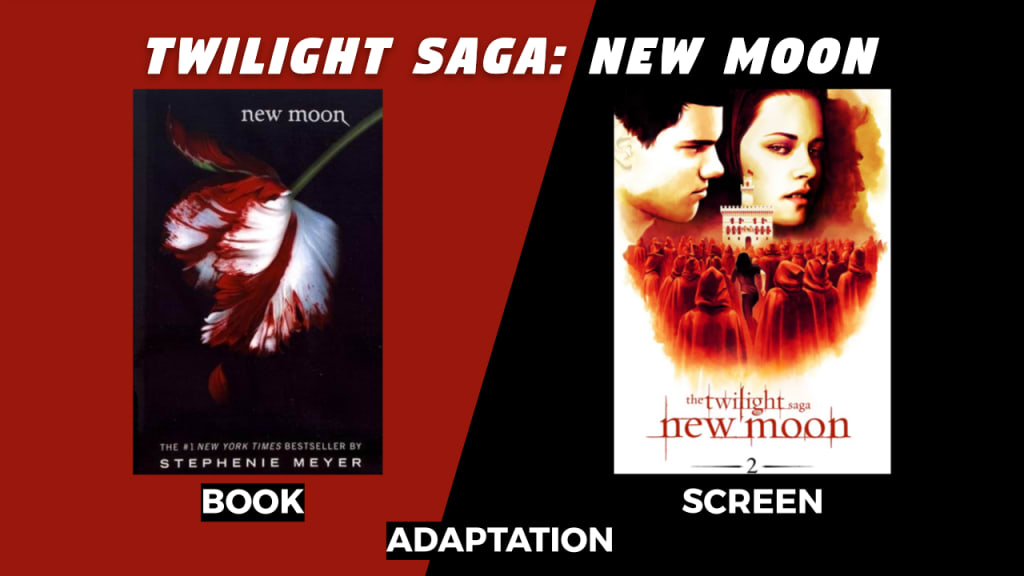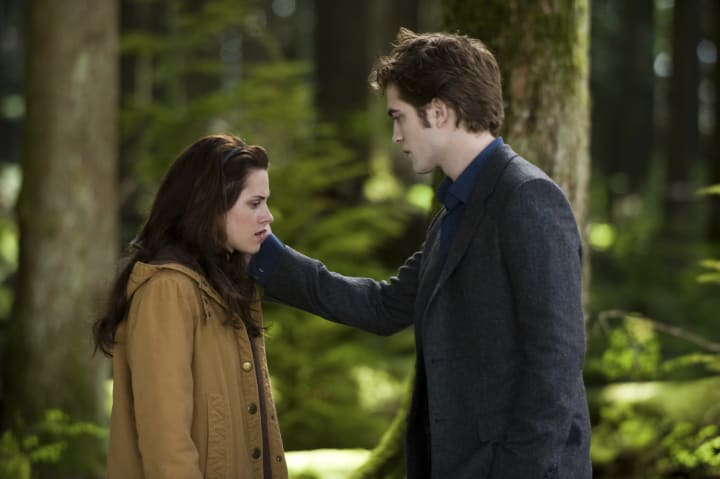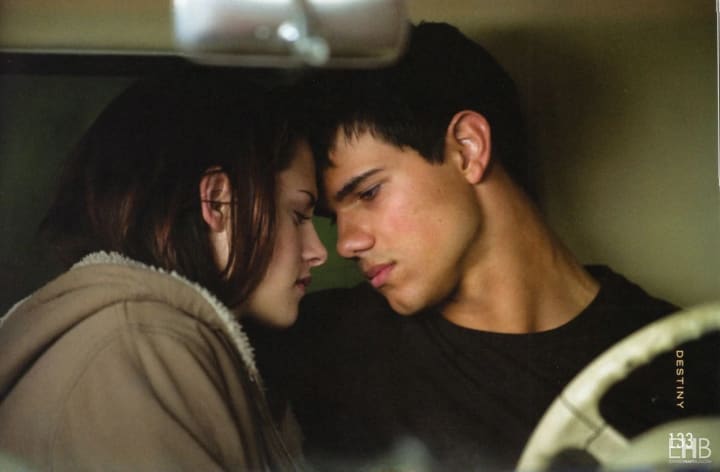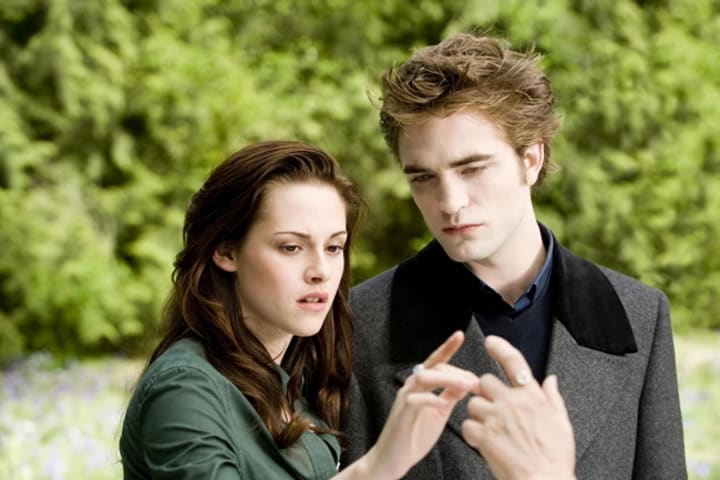Book to Screen: Twilight Saga: New Moon
Reading and watching the second part of Stephanie Meyer's vampire romance

Apologies for the long overdue follow-up to my Book to Screen series; it seems like an eternity (pun intended) since I reviewed and compared The Flatshare novel and its TV adaptation. Now, you may be wondering why the second article for this series is a critical analysis of a sequel. Well, I have already reviewed Twilight in almost all its forms for Vocal – the original novel, the movie, the gender-swapped anniversary edition and the graphic novel adaptation. All of which you are more than welcome to read, but I think I gave very fair and balanced reviews of each iteration of Twilight. In other words, I’ve drained that subject dry.
Let's now take a closer look at the sequel "New Moon" and its movie adaptation, which was directed by Chris Weitz. This analysis will focus on Stephenie Meyer’s book and the screenplay version written by Melissa Rosenberg, as I've already discussed Young Kim’s graphic novel adaptation, which closely follows Meyer’s original writing.
Following a life-threatening incident on her eighth birthday, Bella Swan grapples with the absence of her vampire love, Edward Cullen, and seeks solace in her friendship with Jacob Black, a werewolf. However, she soon finds herself embroiled in a centuries-old conflict, and her unwavering desire to be with Edward at any cost pushes her to take increasingly perilous risks. Here’s how I think this story works in literature and how it translates to screen.

The Book
After the events of Twilight, Stephanie Meyer’s New Moon picks up several months after Bella is almost killed by a homicidal vampire and is remarkably determined to become a vampire to be with Edward forever. The intentional references to Romeo and Juliet are not missed by the reader. Still, Bella, Edward and Jacob are much more layered than the love triangle in Juliet, Romeo and Paris. It may not be the best love triangle, but it finds more depth as a screenplay. In the book, it could be better. Back in the first-person perspective of Bella Swan, more so following a character overcoming severe depression after losing her vampire lover.
As a teenager, I gave this a five-star rating, so revisiting it as an adult has definitely been an interesting experience. Ilyana Kadushin narrates the audiobooks as Bella, and although I wasn’t too keen on this casting in the first book, I warmed to her narrative style in the second reading. I think the prose was better in this book, but I think I’ll have a consistent issue with two distinct aspects of Twilight if I read the third and fourth books.
Pacing and foreshadowing are aspects of Meyer’s writing that I find particularly challenging. Many scenes in the book tend to drag on, which I believe is more of an editing issue and has a noticeable impact on the story's pacing. However, the slow pacing of the book does work in certain ways that it didn’t in the first installment. Bella’s isolation and struggles with her mental health are integral to the story and here, Meyer captures a nuanced portrayal of depression. Actually, I think this was my favourite book of the series, and Bella’s characterisation and narrative voice made a lot more sense from her bleak perspective.
The foreshadowing is very similar to what happened in the prequel, and I believe Bella has similar moments of clarity in the following parts. Bella has key revelations through her dreams that border on psychic premonitions. Ignoring the fact that I know the werewolf reveal, Bella does take a startlingly long time to realise what is really happening with Jacob, but Meyer does take the time and effort to conceal this reveal from the reader.
Speaking of Jacob, this was my first introduction as a reader, and I realised that some authors would write an absolute golden retriever love interest and completely character-assassinate them to make room for the endgame—and often brooding—love interest to come back. The irony is that looking at this from an older perspective, Jacob and Bella had a much more solid foundation for a relationship. Edward and Bella have the whirlwind romance of an escapist fantasy. It’s passionate and all-consuming intensity, whereas the calmness of Bella’s interactions with Jacob provides a security that Edward cannot. I understand the danger of Edward’s bloodlust and pining for Bella makes him attractive to a certain demographic, which adds to the appeal of the escapist romance. Still, both love interests make for poor suitors for Bella by the end of the book. While Edward is guilt-ridden and eager to make amends, Jacob does a completely drastic and petty character flip by the final chapter. Was I Team Jacob as a teenager? Yes, but that completely changed by the time I read Eclipse. As an adult, I’m Team Bella Stays Single. Sadly, that’s not the case.
One stronger aspect of the book that I found captivating but feel deserves more attention is the array of antagonistic threats that Bella encounters. The absence of the Cullens heightens the suspense surrounding the peril posed by Victoria, the Volturi, and the introduction of the werewolves, thereby adding depth and intrigue to the narrative. The expansion of the universe's lore and mythology contributes to a heightened sense of danger when viewed from a human perspective.
As a teenager, I found this book to be a five-star read. However, with more writing experience, I would now rate it as a generous three or four stars. While it brings back nostalgic memories, I'm now able to approach it more critically, unlike when I was younger and simply enjoyed its angst and melodrama.
My rating for Stephanie Meyer's New Moon is ★★★½.

The Movie
In early November 2008, Summit Entertainment secured the film adaptation rights to the Twilight series' remaining novels, including New Moon, Eclipse, and Breaking Dawn. The movie adaptation of New Moon was released the following year. Melissa Rosenberg returned as the screenwriter, and due to scheduling conflicts, Chris Weitz took over as the director in place of Catherine Hardwicke. The film also saw the return of key cast members, including Kristen Stewart, Robert Pattinson, and Taylor Lautner, in their respective roles.
The film stayed true to the book's plot, with no major deviations. Rosenberg's script, which was approved by the author, was a strong foundation for the film. More importantly, the character beats and pacing, which were areas of concern for me in the book, were significantly improved in the screen adaptation. Rosenberg’s screenwriting excels in this adaptation, ensuring that Bella is an active participant in her story, rather than just an observer as she sometimes appears in the book.
Chris Weitz also brings a cinematic vision to the film. As much as I enjoyed Hardwicke’s indie take on the story, Weitz brought a stylistic style that demonstrated his strengths in directing fantasy. Truth be told, I saw this film four times when it was released in the cinema. The returning and new cast members – including Michael Sheen and Dakota Fanning – were all great in their respective roles. Kristen Stewart gave strong performances, but I think here is where Robert Pattinson’s frustration with disagreements on his portrayal of the character started to show. Although he was barely in this film, his performance seemed a bit wooden compared to his previous roles.
I would have directed the actors differently in some scenes, especially in the breakup scene. I just think they didn’t find the right tone for that scene. Stewart seemed restrained and Pattinson sounded almost bored. The scenes afterward were much stronger and included better performances all around.
The world felt much bigger in this film, not only because of the surprisingly good CGI for the werewolves but also because of the stunts and locations featured throughout the film. This is definitely one of my favourite of the five Twilight films.
My rating for The New Moon film adaptation is ★★★★★.

My Final Verdict: Which is Better? - The Adaptation.
No surprise, but this one has to go to the film adaptation. Rosenberg's script, Weitz's vision and a much tighter storytelling pace made the film a much more engaging experience.
About the Creator
Enjoyed the story? Support the Creator.
Subscribe for free to receive all their stories in your feed. You could also pledge your support or give them a one-off tip, letting them know you appreciate their work.






Comments
There are no comments for this story
Be the first to respond and start the conversation.